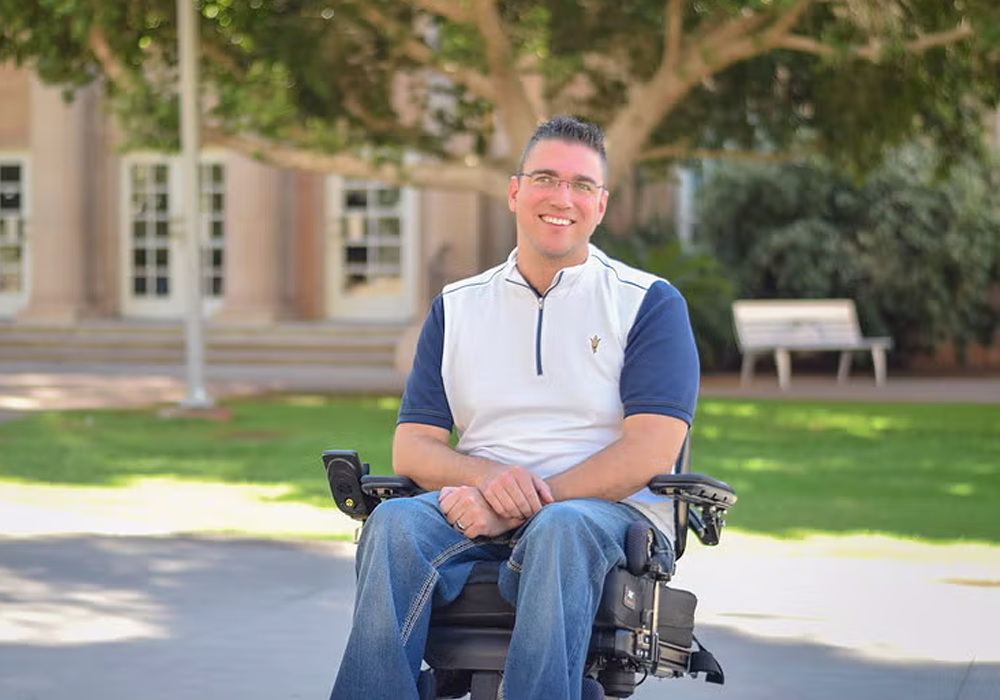A “superhero” to Sun Devils with disabilities

Jacob Bunch was told that, because of his physical and learning disabilities, he would never graduate high school or be “college material.” But Bunch has proven naysayers wrong multiple times over. He is now pursuing his sixth degree, a doctorate of education in leadership and innovation, and has dedicated his career to helping students with disabilities.
Originally from Houston, Bunch was diagnosed with cerebral palsy, a neuromuscular, developmental disability, at only 11 months old. He also faces other learning disabilities secondary to his cerebral palsy including dyslexia, dysgraphia, dyscalculia and generalized information processing disorder. While these types of conditions can present obstacles to academic success, Bunch has taught himself and others the lesson that challenges only help to make you stronger.
He has earned two degrees in speech communication from Blinn College and the University of Texas, two master’s degrees in nonprofit studies and higher education administration from ASU, a master’s in special education from Grand Canyon University and a graduate certificate in assistive technology from Northern Arizona University.
Currently working at the Disability Resource Center at ASU’s Tempe campus as the senior program coordinator for Alternative Format Services, Bunch supports other students with disabilities. He spends his time advocating for students with print-related disabilities, such as dyslexia and visual impairment, who need accommodations.
One of Bunch’s favorite parts of his job is “helping students with disabilities find their ‘voice’ to be able to, in a respectfully assertive manner, self-advocate and as a result become a more self-determining individual.”
Bunch knew since he was a sophomore in high school that he wanted to pursue his doctorate to advocate for students with disabilities. His goal is to one day work his way up to become the executive director for the DRC, but he also wants to teach courses and publish journal articles and books on the topic of disability studies and disability policy.
“I have known since I was in a transition meeting in 10th grade that I was supposed to pursue a doctorate — using it (and everything preceding it) to advocate for students with disabilities,” Bunch said. “To make sure that they are not only afforded an equitable and accessible education but that anyone who comes in contact with my story sees it as proof that there truly are 'assets' to exceptionality and that no one should ever be counted out or written off.”
Jacob Bunch in front of the Disability Resource Center at ASU
One of the reasons Bunch decided to continue his education at ASU was because of the university’s emphasis on providing resources for students with disabilities.
“I chose ASU originally because of the comprehensiveness of its accommodation offerings for students with disabilities,” Bunch said. “Since the time of my first master’s at ASU, I have developed a deep affinity for the ASU community — and have witnessed firsthand the commitment to meaningful inclusion and equitable and accessible education.”
Bunch’s advice for other students with disabilities who are looking for a future career is to be open.
“Openness about your disabilities I believe helps, in that it helps provide perspective, dispelling myths of limitation and incapacity,” Bunch said.
Having been on Supplemental Security Income for many years and receiving an income of only $674 a month, Bunch understands the struggles that come with finding employment with a disability. However, after working diligently for six years, he was able to find a full-time job at ASU with a livable wage and benefits, which he says he does not take for granted.
“My understanding is that more than 70% of people with disabilities do not have gainful employment, so I know the value of not being a part of that statistic any longer,” Bunch said. “And as a result I have a strong work ethic and appreciate the investment ASU has made in me professionally, affirming that I do have a contributive value in the workplace.”
Bunch said he wouldn’t be where he is today without the late Theresa Haven, who taught him about his current role and Renae Hackman, his first supervisor at ASU at the Disability Resource Center.
Hackman met Bunch when he applied to be the alternative format senior coordinator at the DRC. “It was very clear during the interview how passionate Jacob was about the position and serving students. .... Jacob’s passion and perseverance continue to motivate him to serve students so that they reach their goals.”
Qualified ASU students can request accommodations they may need for their academic success through DRC Connect and meet with their Disability Access Consultant.
October is National Disability Employment Awareness Month. See the U.S. Department of Labor website for research, resources and more.